brand
Update : N120b USSD debt : Telcos accuses the big DMBs of intransigence of not paying their debt
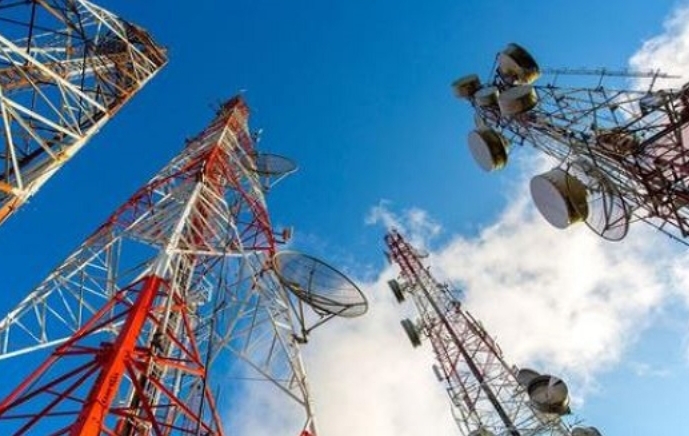

Telecom operators have accused big deposit money banks (DMBs) of owing the huge percentage of the N120 billion debts that arose from the use of Unstructured Supplementary Service Data (USSD). They also accused the big DMBs of intransigence in paying the debt.
Acting under the aegis of Association of Licensed Telecoms Companies of Nigeria (ALTON), the operators also said they were yet to feel the impact of the intervention of the Central Bank of Nigeria (CBN) Governor Godwin Emefiele in resolving the impasse as it has not translated to the payment of the debt by the big banks.
UUSD is a Global System for Mobile Communications (GSM) protocol that is used to send text messages. USSD is similar to Short Message Service (SMS); it uses codes made up of the characters that are available on a mobile phone.
Chairman of ALTON, Gbenga Adebayo, in a telephone interview, said the smaller operators have been responsive and alive to their corporate responsibilities by paying their debts to the operators, adding that the same story could not be told of the big banks that have refused to defray their debts.
According to him, the impact of the debt burden is huge because of the caliber of banks owing.
Adebayo said the CBN governor’s intervention has not resulted into the payment of the debt, meaning such an intervention remained useless at best, adding that the process of final disconnection has started.
He said: “We are now commencing the implementation of the terms of the agreement by sending them notice which will expire after the notice depending on the agreement and once the service notice expires, we will begin to withdraw the service. I must say that some banks are paying. Unfortunately the ones that are not paying are the big banks debtors. I don’t want to mention their names. They are the big ones and that is why it has such a huge impact on the industry. So the smaller ones that are not owing much are paying; some were paying before, we don’t know what happened and they stopped paying, allowing the debts to pile up.”
He said initially when the notice was served, the DMBs agreed but only to turn around to talk about the billing system. He asked rhetorically: “How can billing be the problem after the service has been provided?”
On the CBN’s intervention, he said: “We will begin to see the intervention when the DMBs start paying. We don’t know what intervention they are doing with the banking system but we will see the impact when we start seeing money being paid by the DMBs. So far, we have not seen anything. We are a highly responsible corporate organisation. We are not going to yank off the plug without following due process; all we are doing now is to enforce the terms of the commercial agreement and when the day comes when the notice will expire, we will rightly disconnect.”
brand
JIM OVIA ADMITTED TO THE FREEDOM OF THE CITY OF LONDON
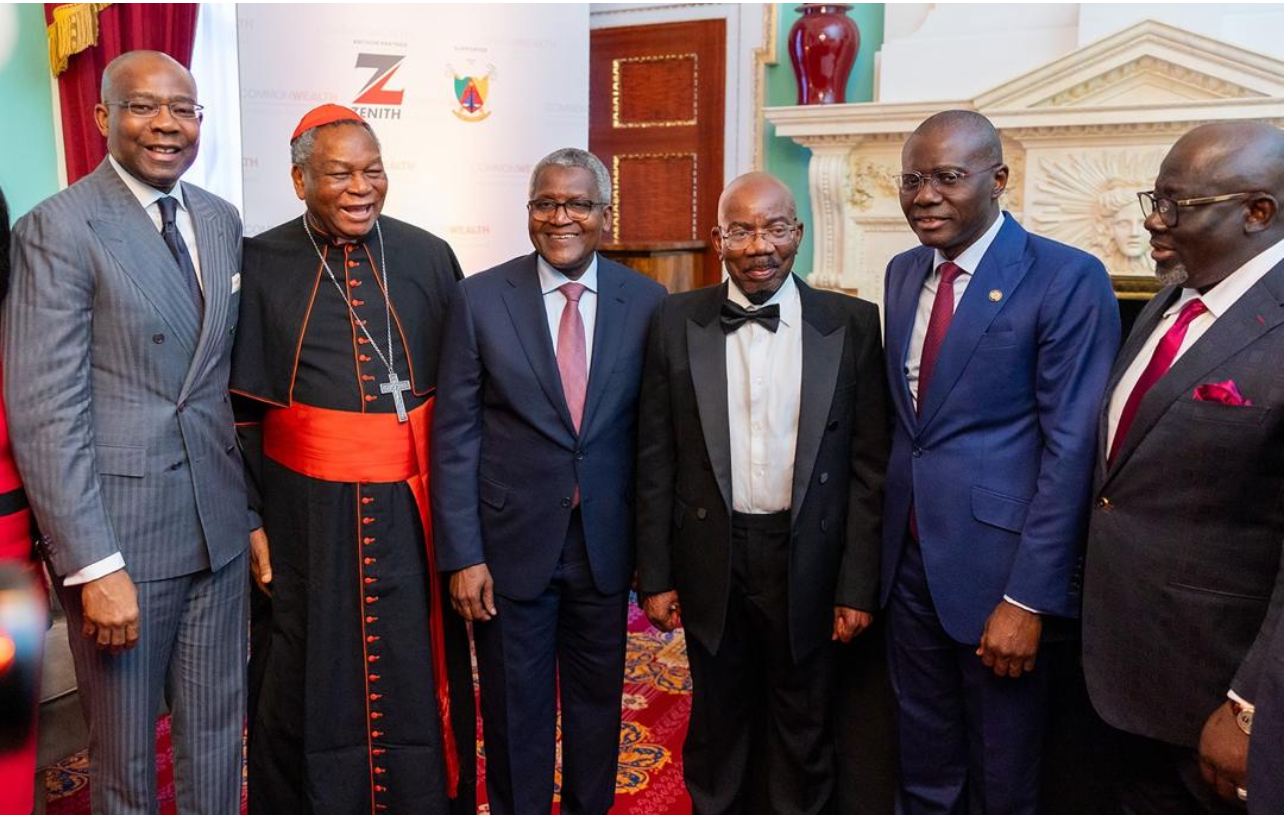
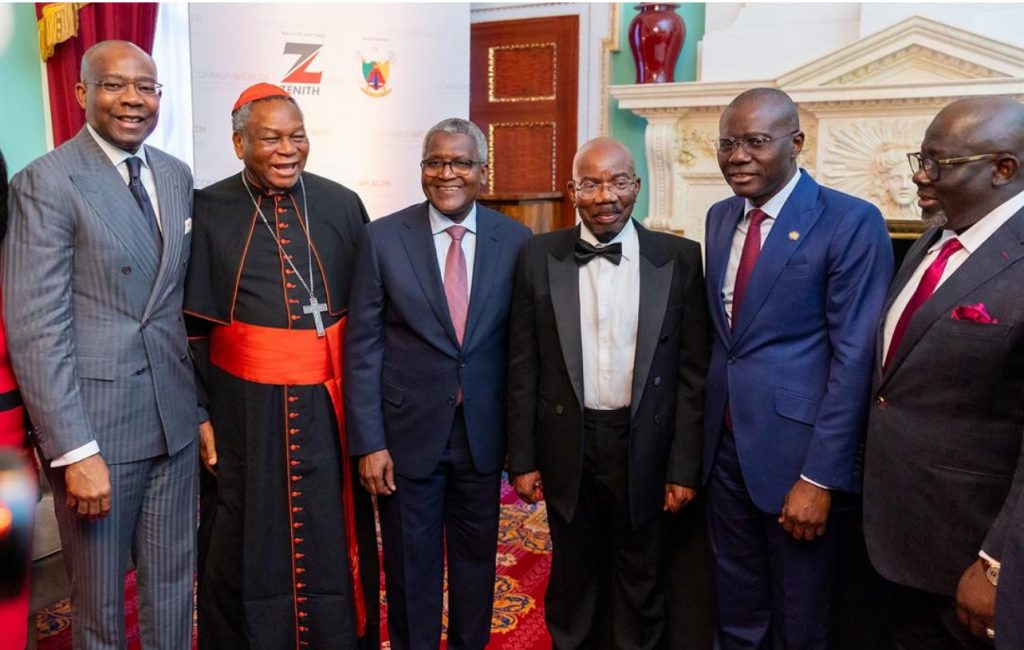 L-R: Chairman, Access Holdings Plc, Aigboje Aig-Imoukhuede, CFR; His Eminence John Cardinal Onaiyekan; President of Dangote Group, Alhaji Aliko Dangote, GCON; Founder and Chairman of Zenith Bank Plc, Jim Ovia, CFR; Governor of Lagos State, Mr. Babajide Sanwo-Olu; and Governor of Delta State, Rt.Hon. (Elder) Sherrif Oborevwori, during the admission of Jim Ovia to the Freedom of the City of London in the United Kingdom, on Monday.
L-R: Chairman, Access Holdings Plc, Aigboje Aig-Imoukhuede, CFR; His Eminence John Cardinal Onaiyekan; President of Dangote Group, Alhaji Aliko Dangote, GCON; Founder and Chairman of Zenith Bank Plc, Jim Ovia, CFR; Governor of Lagos State, Mr. Babajide Sanwo-Olu; and Governor of Delta State, Rt.Hon. (Elder) Sherrif Oborevwori, during the admission of Jim Ovia to the Freedom of the City of London in the United Kingdom, on Monday.
The Founder and Chairman of Zenith Bank Plc, Jim Ovia, CFR, has been admitted to the prestigious Freedom of the City of London in a distinguished ceremony which held at the Mansion House, City of London on Monday, April 7, 2025. This prestigious accolade is a testament to Mr. Ovia’s exceptional contributions to the global financial landscape, unwavering commitment to fostering economic development, and dedication to philanthropic endeavours that have positively impacted countless lives.The Freedom of the City of London, a time-honoured tradition dating back to the 13th century, is one of the oldest surviving ceremonies in the United Kingdom. Historically, it granted freemen certain rights and privileges within the city. Today, it stands as a symbolic recognition of individuals who have made outstanding contributions to London or the wider society. This honour places Mr. Ovia among a distinguished group of recipients, which includes notable figures from various fields such as Nelson Mandela, Bill Gates, Sir Winston Churchill, Desmond Tutu, Harry Kane, Morgan Freeman and Ian Wright.Commenting on his new status as a Freeman of the City of London, the distinguished honoree, Jim Ovia, CFR said “It is indeed a great honour to be admitted to the prestigious Freedom of the City of London. This is not just a recognition of my personal achievements, but also a testament to the tireless efforts of the entire Zenith team who have worked diligently to establish our institution as a leading force in global finance. I am proud to be part of a legacy that celebrates innovation, excellence and the spirit of entrepreneurship. I dedicate this to the people of Nigeria and Africa who continue to inspire me with their resilience and determination. I look forward to continuing to play a role in shaping the economic landscape of our great continent and beyond.”Joining the nation in congratulating Mr. Ovia, President Bola Tinubu, through a press statement by the Special Adviser to the President on Information and Strategy, Bayo Onanuga, commended Mr. Ovia for being a distinguished ambassador of the nation’s private sector. He described the honour as a fitting recognition of his exceptional contributions to business, innovation, and technology, as well as for his role in shaping Nigeria’s financial landscape and strengthening economic ties between Africa and the rest of the world. According to him, “This honour is a testament to your unwavering commitment to excellence, your pioneering role in the growth of the financial services sector in Nigeria, and your visionary leadership that continues to inspire generations. As an accomplished entrepreneur and advocate of innovation-driven development, your recognition in the City of London affirms the global relevance of Nigerian excellence and enterprise”.Dignitaries at the ceremony include Former President of Nigeria, Chief Olusegun Obasanjo, GCFR; Governor of Lagos State, Mr. Babajide Sanwo-olu; Governor of Delta State, Rt.Hon. (Elder) Sherrif Oborevwori; Governor of Enugu State, Dr. Peter Mbah; President of Dangote Group, Alhaji Aliko Dangote, GCON; Minister of State for Finance, Dr. Doris Uzoka-Anite; Minister of Industry, Trade and Investment, Dr. Jumoke Oduwole, MFR; Minister of State for Foreign Affairs, Bianca Odumegwu-Ojukwu; Oba of Oniru, Oba Abdulwasiu Lawal; Group Managing Director, TGI Group of Companies, Rahul Savara; Obi of Onitsha, Igwe Nnaemeka Alfred Achebe, CFR, and His Eminence John Cardinal Onaiyekan, who joined Zenith Bank Executives in celebrating this significant milestone.This well-deserved recognition rides on the back of many other prestigious awards that Mr. Ovia has received for his outstanding contributions to banking, education and philanthropy including conferment of Commander of the Federal Republic (CFR) & National Productivity Order of Merit (NPOM) Award in 2022 by the Federal Government of Nigeria. He was also named the Banker of the Year in 2007 and Titan of the year in 2024 by ThisDay Newspaper, and received the African Business Leader Award from the Africa-America Institute. He received honorary degrees from the University of Lagos as well as from the University of Nigeria, Nsukka and was recognized by Forbes Africa as one of the most influential figures in banking.
brand
GTCO Plc Releases 2024 Full Year Audited Results …Pays Shareholders Record Dividend of N8.03k for 2024 Financial Year
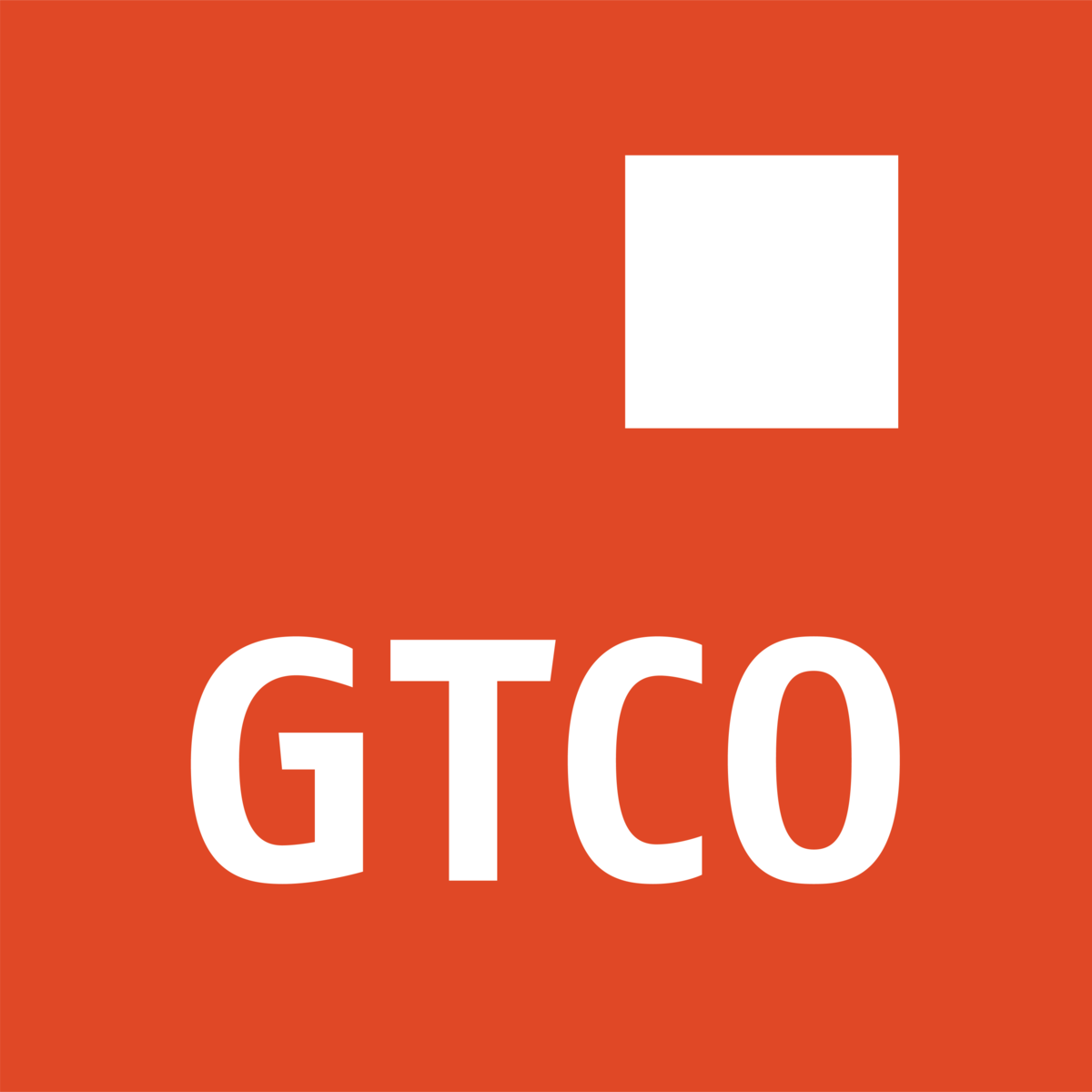
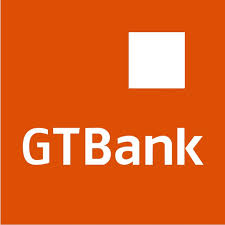 Guaranty Trust Holding Company Plc (“GTCO” or the “Group”) has released its Audited Consolidated and Separate Financial Statements for the year ended December 31, 2024, to the Nigerian Exchange Group (NGX) and London Stock Exchange (LSE). The Group reported profit before tax of 1.266trilion, representing an increase of 107.8% over₦ 609.3billion recorded in the corresponding year ended December 2023₦ . This performance reflects not just strong earnings but also the quality and sustainability of our earnings, underpinned by a well-diversified revenue base, robust risk management practice, and disciplined capital management. The Group recorded growth across all financial and non-financial metrics, and continues to maintain a well-structured, healthy, and diversified balance sheet. The Group’s loan book (net) increased by 12.3% from 2.48trillion in December 2023 to 2.79trillion in December 2024, while deposit liabilities grew by₦ ₦ 37.8% from 7.55trillion to 10.40trillion during the same period. Total assets and shareholders’ funds₦ ₦ closed at 14.8trillion and 2.7trillion, respectively. Capital Adequacy Ratio (CAR) remained very robust₦ ₦ and strong, closing at 39.3%, likewise, asset quality was sustained as evidenced by IFRS 9 Stage 3 Loans which closed at 3.5% at Bank Level and 5.2% at Group in December 2024 (2023: Bank, 2.5%; Group, 4.2%) and cost of risk (COR) closed at 4.9% from 4.5% in December 2023. Commenting on the results, the Group Chief Executive Officer of Guaranty Trust Holding Company Plc (GTCO Plc), Mr. Segun Agbaje, said; “Our strong performance for 2024 underscores the resilience and depth of our business, driven by a well-diversified earnings base across our banking and non-banking subsidiaries, all of which are P&L positive. Our capacity to generate sustainable high-quality earnings, maintain strong asset quality, and drive cost efficiencies reflects the soundness of our long-term strategy and disciplined execution. We have also prudently provided for all our forbearance loans, well ahead of the June 2025 timeline, whilst fully accruing for the windfall tax, further strengthening our balance sheet and enhancing financial resilience.He further added; “The total dividend of N8.03k for the 2024 FYE is underpinned by the quality of our earnings and is in line with our long tradition of increasing dividend pay-out year-on year. Looking ahead, we remain committed to building a Financial Services Group that thrives on innovation, operational efficiency, and sustainable profitability. We will continue to deepen our relationships with customers, leverage technology to deliver cutting-edge financial solutions, and accelerate the growth of all our business verticals—Banking, Funds Management, Pension, and Payments—to unlock new opportunities and create more value for our shareholders.”Overall, the Group continues to post one of the best metrics in the Nigerian Financial Services industry in terms of key financial ratios i.e., Pre-Tax Return on Equity (ROAE) of 60.5%, Pre-Tax Return on Assets (ROAA) of 10.3%, Capital Adequacy Ratio (CAR) of 39.3% and Cost to Income ratio of 24.1%.Guaranty Trust Holding Company Plc (GTCO Plc) is a leading financial services group with operations across Africa and the United Kingdom. Renowned for its strong corporate governance, innovative financial solutions, and customer-centric approach, GTCO Plc provides a wide range of banki .5%, Pre-Tax Return on Assets (ROAA) of 10.3%, Capital Adequacy Ratio (CAR) of 39.3% and Cost to Income ratio of 24.1%.Guaranty Trust Holding Company Plc (GTCO Plc) is a leading financial services group with operations across Africa and the United Kingdom. Renowned for its strong corporate governance, innovative financial solutions, and customer-centric approach, GTCO Plc provides a wide range of banking and
Guaranty Trust Holding Company Plc (“GTCO” or the “Group”) has released its Audited Consolidated and Separate Financial Statements for the year ended December 31, 2024, to the Nigerian Exchange Group (NGX) and London Stock Exchange (LSE). The Group reported profit before tax of 1.266trilion, representing an increase of 107.8% over₦ 609.3billion recorded in the corresponding year ended December 2023₦ . This performance reflects not just strong earnings but also the quality and sustainability of our earnings, underpinned by a well-diversified revenue base, robust risk management practice, and disciplined capital management. The Group recorded growth across all financial and non-financial metrics, and continues to maintain a well-structured, healthy, and diversified balance sheet. The Group’s loan book (net) increased by 12.3% from 2.48trillion in December 2023 to 2.79trillion in December 2024, while deposit liabilities grew by₦ ₦ 37.8% from 7.55trillion to 10.40trillion during the same period. Total assets and shareholders’ funds₦ ₦ closed at 14.8trillion and 2.7trillion, respectively. Capital Adequacy Ratio (CAR) remained very robust₦ ₦ and strong, closing at 39.3%, likewise, asset quality was sustained as evidenced by IFRS 9 Stage 3 Loans which closed at 3.5% at Bank Level and 5.2% at Group in December 2024 (2023: Bank, 2.5%; Group, 4.2%) and cost of risk (COR) closed at 4.9% from 4.5% in December 2023. Commenting on the results, the Group Chief Executive Officer of Guaranty Trust Holding Company Plc (GTCO Plc), Mr. Segun Agbaje, said; “Our strong performance for 2024 underscores the resilience and depth of our business, driven by a well-diversified earnings base across our banking and non-banking subsidiaries, all of which are P&L positive. Our capacity to generate sustainable high-quality earnings, maintain strong asset quality, and drive cost efficiencies reflects the soundness of our long-term strategy and disciplined execution. We have also prudently provided for all our forbearance loans, well ahead of the June 2025 timeline, whilst fully accruing for the windfall tax, further strengthening our balance sheet and enhancing financial resilience.He further added; “The total dividend of N8.03k for the 2024 FYE is underpinned by the quality of our earnings and is in line with our long tradition of increasing dividend pay-out year-on year. Looking ahead, we remain committed to building a Financial Services Group that thrives on innovation, operational efficiency, and sustainable profitability. We will continue to deepen our relationships with customers, leverage technology to deliver cutting-edge financial solutions, and accelerate the growth of all our business verticals—Banking, Funds Management, Pension, and Payments—to unlock new opportunities and create more value for our shareholders.”Overall, the Group continues to post one of the best metrics in the Nigerian Financial Services industry in terms of key financial ratios i.e., Pre-Tax Return on Equity (ROAE) of 60.5%, Pre-Tax Return on Assets (ROAA) of 10.3%, Capital Adequacy Ratio (CAR) of 39.3% and Cost to Income ratio of 24.1%.Guaranty Trust Holding Company Plc (GTCO Plc) is a leading financial services group with operations across Africa and the United Kingdom. Renowned for its strong corporate governance, innovative financial solutions, and customer-centric approach, GTCO Plc provides a wide range of banki .5%, Pre-Tax Return on Assets (ROAA) of 10.3%, Capital Adequacy Ratio (CAR) of 39.3% and Cost to Income ratio of 24.1%.Guaranty Trust Holding Company Plc (GTCO Plc) is a leading financial services group with operations across Africa and the United Kingdom. Renowned for its strong corporate governance, innovative financial solutions, and customer-centric approach, GTCO Plc provides a wide range of banking and
non-banking services, including payments, funds management, and pension fund administration. The Group is committed to delivering long-term value to stakeholders while driving growth and development across its markets.Corporate Communications
brand
ZENITHz BANK MAINTAINS SUPERLATIVE PERFORMANCE WITH PBT OF N1.3 TRILLION IN FULL YEAR 2024
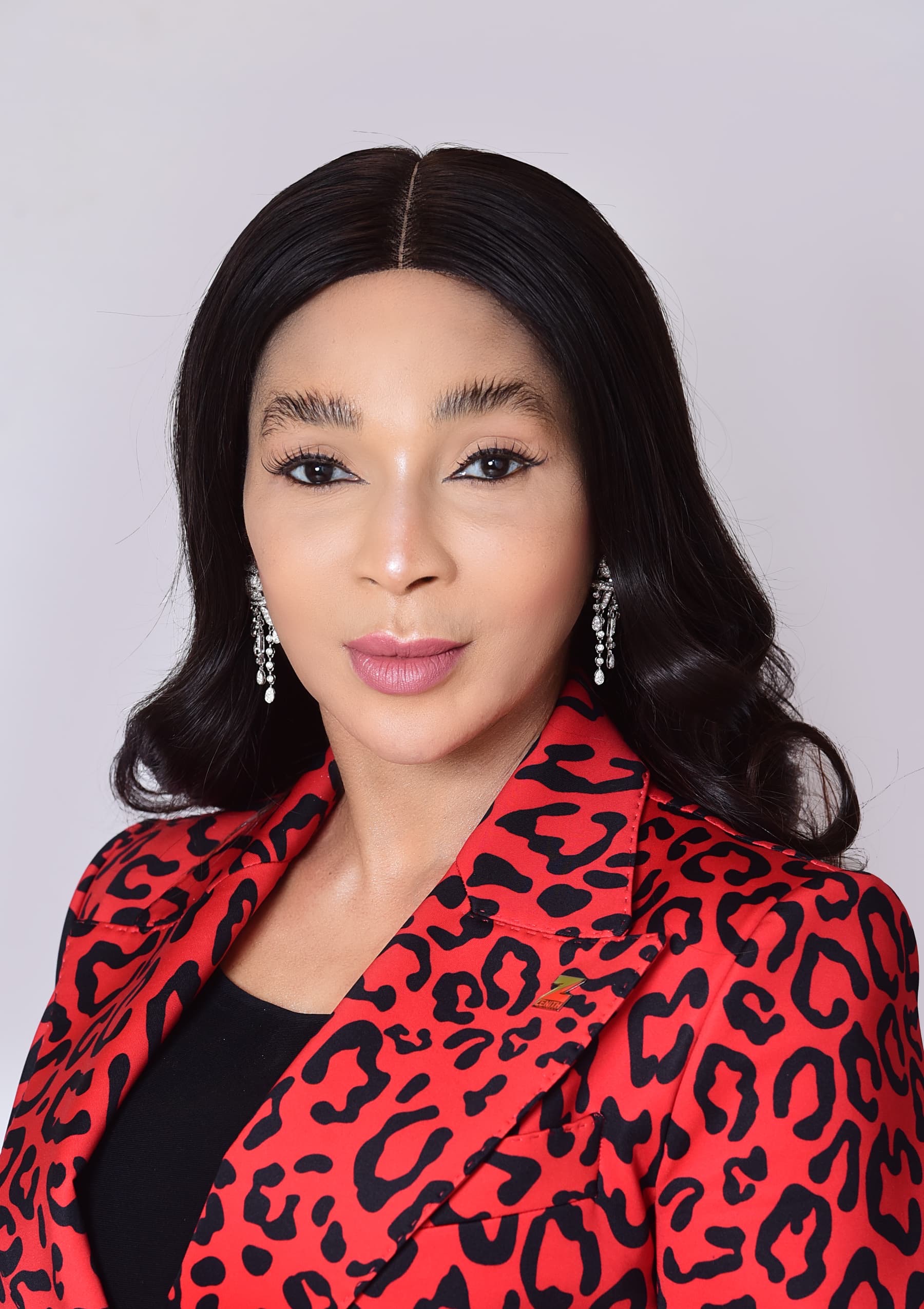
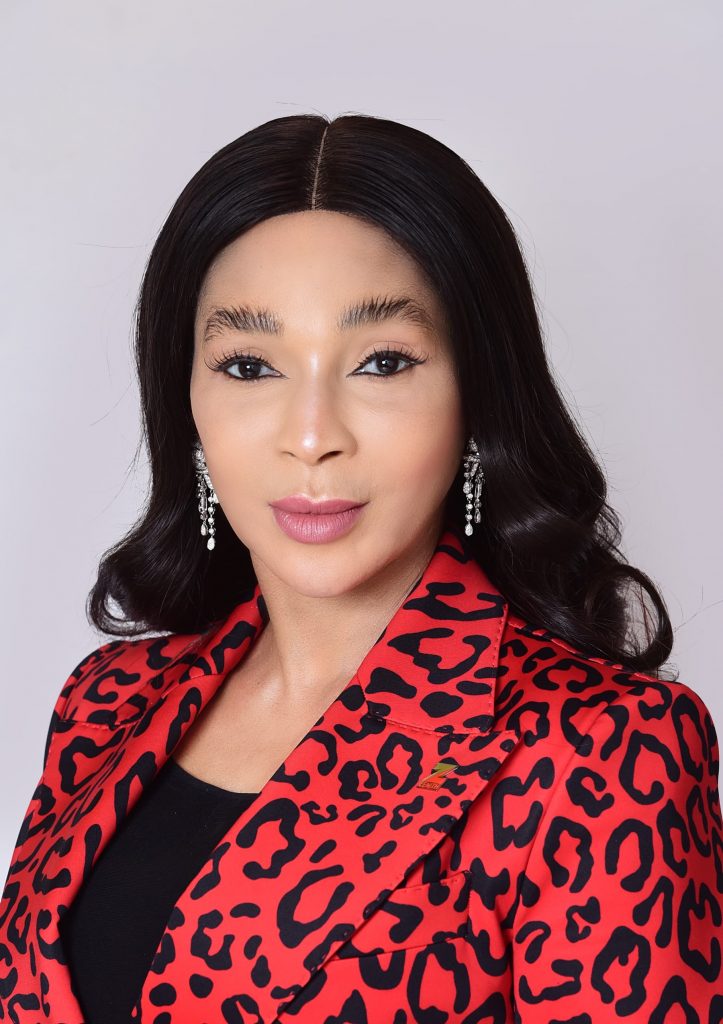 Zenith Bank Plc has announced its audited financial results for the year ended December 31, 2024, delivering significant growth across key performance indicators. The Bank’s impressive performance reflects effective management and pricing of its risk assets, as well as an optimized treasury portfolio, reinforcing its position as a leader in Nigeria’s banking industry.According to the audited financial results for the 2024 financial year presented to the Nigerian Exchange (NGX), the Bank recorded a double-digit year-on-year (YoY) growth of 86% in gross earnings, increasing from N2.13 trillion in 2023 to N3.97 trillion in 2024. This growth was driven by a 138% increase in interest income, supported by investment in high-yield government securities, and growth in the Bank’s loan book.Commenting on the results, Dame Dr Adaora Umeoji OON, Group Managing Director/CEO, stated “This year’s performance underscores our unwavering commitment to innovation and customer-centric solutions. We will also remain focused on deepening financial inclusion, enhancing service delivery, and creating value for our customers and stakeholders.Zenith Bank’s profit before tax (PBT) rose by 67%, reaching N1.3 trillion in 2024 from N796 billion in 2023, driven by a combination of top-line expansion and efficient treasury portfolio management. Net interest income increased by 135% from N736 billion in 2023 to N1.7 trillion, reinforcing the Bank’s strong core banking performance and ability to grow earnings despite macroeconomic headwinds. Non-interest income also grew by 20% from N919 billion to N1.1 trillion. The Bank’s total assets grew by 47% from N20 trillion in 2023 to N30 trillion in 2024, underpinned by a strong liquidity position and effective balance sheet management. Customer deposits surged by 45% from N15 trillion to N22 trillion in 2024, reflecting a historically strong corporate deposits portfolio and a sustained increase in retail deposits. The increase in retail deposits was driven by customer acquisition and the Bank’s strategic focus on low-cost funding.Return on Average Equity (ROAE) declined to 32.5% on the back of the injection of new capital, while Return on Average Assets (ROAA) remained unchanged at 4.1%. The Bank’s cost-to-income increased slightly from 36.1% to 38.9%, despite inflationary pressures. Its Non-Performing Loan (NPL) ratio stood at 4.7%, with a coverage ratio of 223%, underscoring the Bank’s prudent risk management and commitment to maintaining a resilient loan book, ensuring stability and confidence in the Bank’s operations.Given the good earnings performance, the Bank has proposed a final dividend of N4.00 per share, which brings the total dividend for the year to N5.00 per ordinary share. In a significant milestone, Zenith Bank successfully raised N350 billion in capital through a rights issue and public offer, with a subscription rate of 160%, demonstrating strong investor confidence in the Bank’s growth trajectory. The proceeds from this capital raise will be strategically deployed to enhance technology infrastructure, strengthen liquidity, and support the Bank’s expansion into key African markets, unlocking new growth opportunities. The bank remains focused on delivering sustainable growth, enhancing shareholder value, and driving financial inclusion through innovative banking solutions. With its solid capital base and innovative product offerings, the Bank is well-positioned to navigate evolving market conditions while continuing to strengthen its leadership in the Nigerian financial landscape.Zenith Bank’s track record of excellent performance has continued to earn the brand numerous awards including being recognised as the Number One Bank in Nigeria by Tier-1 Capital for the fifteenth consecutive year in the 2024 Top 1000 World Banks Ranking, published by The Banker Magazine. The Bank was also awarded the Bank of the Year (Nigeria) in The Banker’s Bank of the Year Awards for 2020, 2022 and 2024; and Best Bank in Nigeria for four times in five years, from 2020 to 2022 and in 2024, in the Global Finance World’s Best Banks Awards.Further recognitions include Best Commercial Bank, Nigeria for four consecutive years from 2021 to 2024 in the World Finance Banking Awards and Most Sustainable Bank, Nigeria in the International Banker 2023 and 2024 Banking Awards. Additionally, Zenith Bank has been acknowledged as the Best Corporate Governance Bank, Nigeria, in the World Finance Corporate Governance Awards for 2022, 2023 and 2024 and ‘Best in Corporate Governance’ Financial Services’ Africa for four consecutive years from 2020 to 2023 by the Ethical Boardroom. The Bank’s commitment to excellence saw it being named the Most Valuable Banking Brand in Nigeria in the Banker Magazine Top 500 Banking Brands for 2020 and 2021, Bank of the Year 2023 and 2024 at the BusinessDay Banks and Other Financial Institutions (BAFI) Awards, and Retail Bank of the Year for three consecutive years from 2020 to 2022 and in 2024 at the BAFI Awards. The Bank also received the accolades of Best Commercial Bank, Nigeria and Best Innovation in Retail Banking, Nigeria, in the International Banker 2022 Banking Awards. Zenith Bank was also named Most Responsible Organisation in Africa, Best Company in Transparency and Reporting and Best Company in Gender Equality and Women Empowerment at the SERAS CSR Awards Africa 2024; Bank of the Year 2024 by ThisDay Newspaper; Bank of the Year 2024 by New Telegraph Newspaper; and Best in MSME Trade Finance, 2023 by Nairametric
Zenith Bank Plc has announced its audited financial results for the year ended December 31, 2024, delivering significant growth across key performance indicators. The Bank’s impressive performance reflects effective management and pricing of its risk assets, as well as an optimized treasury portfolio, reinforcing its position as a leader in Nigeria’s banking industry.According to the audited financial results for the 2024 financial year presented to the Nigerian Exchange (NGX), the Bank recorded a double-digit year-on-year (YoY) growth of 86% in gross earnings, increasing from N2.13 trillion in 2023 to N3.97 trillion in 2024. This growth was driven by a 138% increase in interest income, supported by investment in high-yield government securities, and growth in the Bank’s loan book.Commenting on the results, Dame Dr Adaora Umeoji OON, Group Managing Director/CEO, stated “This year’s performance underscores our unwavering commitment to innovation and customer-centric solutions. We will also remain focused on deepening financial inclusion, enhancing service delivery, and creating value for our customers and stakeholders.Zenith Bank’s profit before tax (PBT) rose by 67%, reaching N1.3 trillion in 2024 from N796 billion in 2023, driven by a combination of top-line expansion and efficient treasury portfolio management. Net interest income increased by 135% from N736 billion in 2023 to N1.7 trillion, reinforcing the Bank’s strong core banking performance and ability to grow earnings despite macroeconomic headwinds. Non-interest income also grew by 20% from N919 billion to N1.1 trillion. The Bank’s total assets grew by 47% from N20 trillion in 2023 to N30 trillion in 2024, underpinned by a strong liquidity position and effective balance sheet management. Customer deposits surged by 45% from N15 trillion to N22 trillion in 2024, reflecting a historically strong corporate deposits portfolio and a sustained increase in retail deposits. The increase in retail deposits was driven by customer acquisition and the Bank’s strategic focus on low-cost funding.Return on Average Equity (ROAE) declined to 32.5% on the back of the injection of new capital, while Return on Average Assets (ROAA) remained unchanged at 4.1%. The Bank’s cost-to-income increased slightly from 36.1% to 38.9%, despite inflationary pressures. Its Non-Performing Loan (NPL) ratio stood at 4.7%, with a coverage ratio of 223%, underscoring the Bank’s prudent risk management and commitment to maintaining a resilient loan book, ensuring stability and confidence in the Bank’s operations.Given the good earnings performance, the Bank has proposed a final dividend of N4.00 per share, which brings the total dividend for the year to N5.00 per ordinary share. In a significant milestone, Zenith Bank successfully raised N350 billion in capital through a rights issue and public offer, with a subscription rate of 160%, demonstrating strong investor confidence in the Bank’s growth trajectory. The proceeds from this capital raise will be strategically deployed to enhance technology infrastructure, strengthen liquidity, and support the Bank’s expansion into key African markets, unlocking new growth opportunities. The bank remains focused on delivering sustainable growth, enhancing shareholder value, and driving financial inclusion through innovative banking solutions. With its solid capital base and innovative product offerings, the Bank is well-positioned to navigate evolving market conditions while continuing to strengthen its leadership in the Nigerian financial landscape.Zenith Bank’s track record of excellent performance has continued to earn the brand numerous awards including being recognised as the Number One Bank in Nigeria by Tier-1 Capital for the fifteenth consecutive year in the 2024 Top 1000 World Banks Ranking, published by The Banker Magazine. The Bank was also awarded the Bank of the Year (Nigeria) in The Banker’s Bank of the Year Awards for 2020, 2022 and 2024; and Best Bank in Nigeria for four times in five years, from 2020 to 2022 and in 2024, in the Global Finance World’s Best Banks Awards.Further recognitions include Best Commercial Bank, Nigeria for four consecutive years from 2021 to 2024 in the World Finance Banking Awards and Most Sustainable Bank, Nigeria in the International Banker 2023 and 2024 Banking Awards. Additionally, Zenith Bank has been acknowledged as the Best Corporate Governance Bank, Nigeria, in the World Finance Corporate Governance Awards for 2022, 2023 and 2024 and ‘Best in Corporate Governance’ Financial Services’ Africa for four consecutive years from 2020 to 2023 by the Ethical Boardroom. The Bank’s commitment to excellence saw it being named the Most Valuable Banking Brand in Nigeria in the Banker Magazine Top 500 Banking Brands for 2020 and 2021, Bank of the Year 2023 and 2024 at the BusinessDay Banks and Other Financial Institutions (BAFI) Awards, and Retail Bank of the Year for three consecutive years from 2020 to 2022 and in 2024 at the BAFI Awards. The Bank also received the accolades of Best Commercial Bank, Nigeria and Best Innovation in Retail Banking, Nigeria, in the International Banker 2022 Banking Awards. Zenith Bank was also named Most Responsible Organisation in Africa, Best Company in Transparency and Reporting and Best Company in Gender Equality and Women Empowerment at the SERAS CSR Awards Africa 2024; Bank of the Year 2024 by ThisDay Newspaper; Bank of the Year 2024 by New Telegraph Newspaper; and Best in MSME Trade Finance, 2023 by Nairametric
-

 news4 years ago
news4 years agoUPDATE: #ENDSARS: CCTV footage of Lekki shootings intact – Says Sanwo – Olu
-

 news1 year ago
news1 year agoEnvironmental Pollutions : OGONI COMMUNITY CRIES OUT, THREATENS TO SHUT DOWN FIRSTBANK,SHELL OIL COMPANY OPERATIONS FOR NOT PAYING COURT AWARD
-
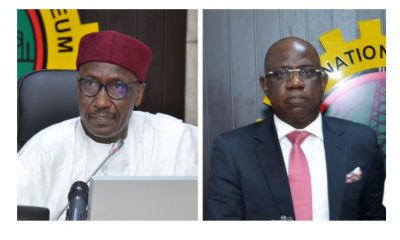
 news1 week ago
news1 week agoBreaking : TInubu appoints Bashir Ojulari as new CEO group of NNPC and GMD mele kyari get sacked, Says Onanuga
-
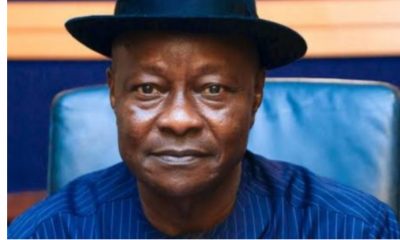
 news2 weeks ago
news2 weeks agoUpdate : Fubara ordered bombing of Rivers Assembly, I am not under duress I resigned, Says ex-Rivers HoS Nwaeke
-
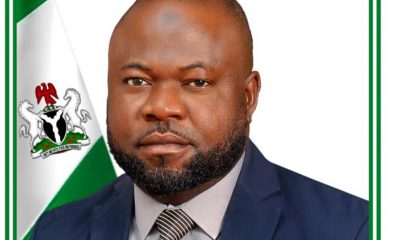
 interview2 weeks ago
interview2 weeks agoNIGERIA MECHANIZED AGRO EXTENSION SERVICE PROJECT, A STRATEGIC MOVE TO ALLEVIATE POVERTY – DR. AMINU ABDULKADIR
-
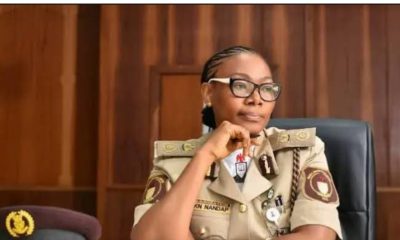
 news2 weeks ago
news2 weeks agoTinubu commended Nandap for her leadership, extends Comptroller-General tenure till 2026, says Onanuga
-

 brand2 weeks ago
brand2 weeks agoGTCO Plc Releases 2024 Full Year Audited Results …Pays Shareholders Record Dividend of N8.03k for 2024 Financial Year
-

 brand2 weeks ago
brand2 weeks agoZENITHz BANK MAINTAINS SUPERLATIVE PERFORMANCE WITH PBT OF N1.3 TRILLION IN FULL YEAR 2024


